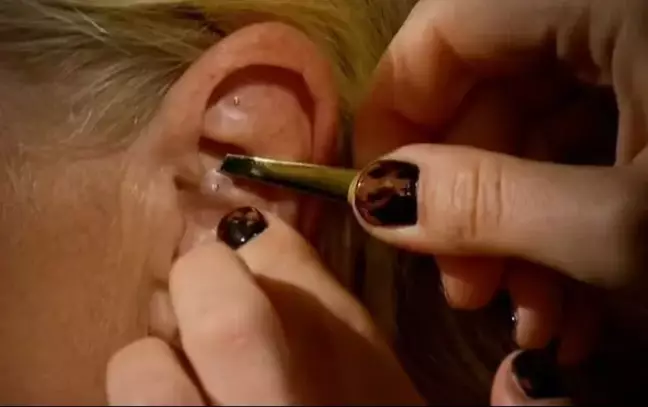The BBC had to remove a Dragons’ Den episode showcasing a product that created history on the show due to concerns about its safety.
The passionate multimillionaires were eager to invest in Giselle Boxer’s “ear seeds” business when she appeared on the popular program, Dragons’ Den. However, doubts about the effectiveness of her product have since emerged, casting a shadow over its credibility.
The 31-year-old from Sheffield achieved a historic moment by entering through the renowned lift doors on the show and securing an unprecedented six offers.
In her pitch, she shared that while working as a fit and active 26-year-old for a leading advertising agency, she received a diagnosis of the incurable disease, M.E. (myalgic encephalomyelitis).
As per the NHS, M.E., also known as chronic fatigue syndrome, is defined as a ‘long-term condition with a broad spectrum of symptoms,’ with extreme tiredness being the most prevalent symptom.
Additional symptoms encompass sleeping difficulties, cognitive and memory challenges, prolonged recovery time after physical activity, and persistent fatigue even after adequate rest or sleep.
In some cases, individuals may also endure muscle or joint pain, headaches, a sore throat, flu-like symptoms, dizziness or nausea, and rapid or irregular heartbeats (heart palpitations).

The episode featuring Giselle Boxer has been removed from the BBC’s streaming service. Credit: BBC
M.E is a condition without a cure, and the focus of treatment is primarily on alleviating symptoms. The NHS suggests individuals consider cognitive behavioural therapy (CBT), energy management, and medications for pain or sleep to address the associated challenges.
In her efforts to attract investments from the six Dragons – Deborah Meaden, Peter Jones, Touker Suleyman, Steven Bartlett, Sara Davies, and Gary Neville – Boxer asserted that due to her health issues, she had been confined to her home, often unable to walk for more than five minutes without needing to return to bed.
She mentioned that medical professionals had conveyed to her that recovery, employment, or having children were unlikely possibilities. This led her to embark on a ‘personal healing journey,’ incorporating elements such as dietary changes, acupuncture, Chinese herbs, and the use of ear seeds.
The entrepreneur elaborated, stating, “Ear seeds are a traditional Chinese medicinal device rooted in acupuncture principles, minus the needles. These minuscule beads adhere to the ear, exerting pressure on nerve endings. By transmitting signals to the brain and body, they facilitate the relaxation of the nervous system, the release of endorphins, and the natural alleviation of pain.”
Boxer conveyed that her health journey had “contributed to her recovery within 12 months,” and shortly thereafter, she became pregnant.
She sought a £50,000 investment in exchange for a 10 percent stake in her business. Ultimately, she reached an agreement with Steven Bartlett, the host of the Diary of a CEO podcast, for a 12.5 percent share.
Nevertheless, Acu Seeds has reportedly been reported to the Advertising Standards Authority following the episode that aired on 18 January. This is attributed to the ‘unproven claims’ made by Boxer during her pitch.

Boxer claimed that ‘ear seeds’ had drastically aided her recovery from M.E. Credit: BBC
The UK-based charity Action for ME sent an open letter to the chairs of two House of Commons select committees expressing their ‘serious concerns’ regarding Boxer’s promotion of her product. The charity highlighted that her endorsement implied that the ear seeds were instrumental in her recovery and should be regarded as an effective treatment.
The Acu Seeds website includes a disclaimer stating that the product is not intended for the diagnosis, treatment, cure, or prevention of any disease.
Complaints were lodged by both medical professionals and ‘vulnerable sick people,’ contending that the product was providing M.E sufferers with ‘false hope.’ In response to these concerns, the BBC opted to remove the Dragons’ Den episode from iPlayer.
The broadcaster clarified that the inclusion of products on the program should not be construed as an endorsement. However, acknowledging the concerns raised by campaign groups, they expressed a commitment to taking those concerns seriously.
Controversy surrounding Boxer’s product also ignited on social media platforms.
A spokesperson from the BBC informed LADbible, “We’re taking the concerns raised seriously, so we are reviewing the episode and therefore it’s currently not available on iPlayer.”





